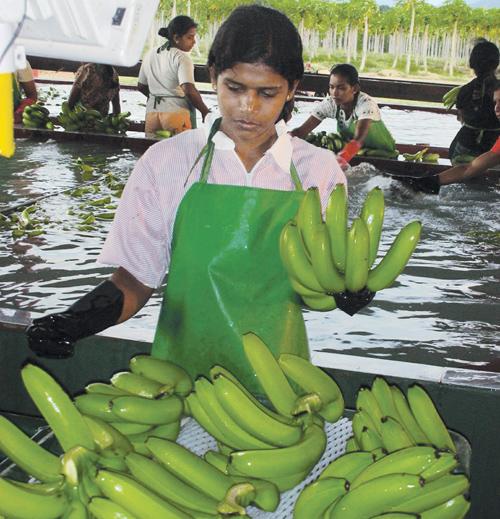
The need for thought leadership, robust and an action oriented mechanism where all stakeholders of the agriculture sector could work together was highlighted to overcome the critical issue of productivity in the sector at a workshop in Colombo last week.
The efforts taken in the past to take agriculture to the next level could be termed as ‘fractured efforts’. Among the critical challenges facing agriculture are linking rural growers to international and local value chains, addressing labour shortages where mechanization of activities could play a key role and lack of cohesive policy framework to encourage the cultivation of high value-added crops, said National Agri Business Council Chairman Rizvi Zaheed.
Agriculture stands at the core of Sri Lankan society and economy with 30 percent of the population involved in agriculture. Though GDP contribution from agriculture hovers at around 10 percent, the influence of agriculture on life is very significant, he said.
The National Agribusiness Council workshop on ‘Challenges in Agriculture’ in Colombo last week, focused on identifying various impediments and to see ways and means in increasing productivity levels in the entire agriculture sector.
The world population at present stands at 7.3 billion and it is expected to reach 8.5 billion by 2030 and 10 billion in 2050. In this regard, one of the most crucial issues will be the food safety and nutrition.
“We need to have a quality product to enable sustainable agriculture. In this regard sustainability, innovation, enhancement of agriculture extensions and best practices of agriculture play a vital role in the progress of the sector. The insufficient productivity is the crucial issue the sector faces at present,” he said.
Successive governments have made substantial investments and implemented various programs to develop the national agriculture sector. In spite of all these efforts the country annually spends over Rs. 200 billion to import food. The productivity levels of most of the sub sectors in agriculture are much below potential and one of the top priorities of the government is to address this crucial issue without any further delay, he said.
Sri Lanka at various times over the years has tried to address the issue of food security and food nutrition while ensuring sustainable incomes to farmers and ensuring returns to all stakeholders.
The focus on sustainability and innovation in agriculture too has not achieved traction. Hence, agriculture has not taken off to the levels required, given the opportunity and potential to develop this important sector.
The time is therefore opportune and urgent to put every effort to increase productivity in the entire agriculture sector and thought leadership at a new level is now required to propel agriculture in to a new paradigm, Food and Agriculture Organization of the United Nations Assistant Representative, Dr. D.B.T. Wijeratne said.
“Sri Lanka’s agricultural productivity is surprisingly low and this vital sector can not create new jobs to attract youth, while services and industry are five to six times more productive. The country needs almost double the present agricultural productivity levels including the plantation sector as well,” he said.
It is essential in leveraging the country’s natural capital to drive socio-economic development and ensuring food security and nutrition security. The seeds and planting material is at the core in achieving desired level of out put and the land bank concept should be made a reality, he said.
The agricultural sector absorbs nearly 30 percent of the total labour force in the country while utilizing 43 percent of the total land area. The sector remains as the mainstay of the rural economy in Sri Lanka thus indicating its influence to the national economy.
While the efforts at introducing responsible agriculture through initiatives such as Sri Lanka Good Agriculture Practices have to be lauded, the gains in productivity must of necessity come from an approach of sustainable agriculture which takes care of farmer livelihoods, stakeholder returns and the environment.
The need for developing and sustaining global and domestic agri value chains is now critical and required thought leadership and action in a renewed manner, he said.
Export earnings from agricultural products from Sri Lanka have been increasing in value terms, with the share of agricultural exports in total exports accounting for 25 percent.
Domestic agriculture still provides approximately 80 percent of Sri Lanka’s food requirement in value terms. However, the immediate need is to undertake the much needed reforms in order to effectively contribute to a sustained growth while enhancing farmer and producer incomes.
The efforts to mitigate existing constraints and future challenges will augur well for the sector.
blurb:’Successive governments have made substantial investments and implemented various programs to develop the national agriculture sector. In spite of all these efforts the country annually spends over Rs. 200 billion to import food.
The productivity levels of most of the sub sectors in agriculture are much below potential and one of the top priorities of the government is to address this crucial issue without any further delay’
